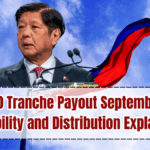Retirement planning is one of the most important concerns for Filipino workers, especially those who have served in different sectors throughout their careers. The Philippines has two major social security systems: the Social Security System (SSS) for private-sector employees and the Government Service Insurance System (GSIS) for public-sector workers.
A common question arises: Can someone who worked in both the private and public sectors claim both SSS and GSIS pensions? In 2025, with new updates in pension policies and clarifications issued by both institutions, the answer depends on eligibility rules, contribution history, and specific legal provisions.
This article provides a clear breakdown of whether you can receive both pensions, who qualifies, and how the process works.

Understanding SSS and GSIS
Before answering the main question, it’s important to distinguish the two systems:
-
SSS (Social Security System): Covers private employees, self-employed individuals, household workers, and OFWs. It provides retirement, disability, maternity, and survivor benefits.
-
GSIS (Government Service Insurance System): Covers public-sector employees, including teachers, military personnel, and government workers. It provides retirement, life insurance, loans, and related benefits.
Both systems operate independently, but there are special rules for workers who contributed to both at different times in their careers.
Can You Receive Both SSS and GSIS Pensions?
The short answer is: Yes, but not always.
It depends on whether the person qualifies for retirement benefits under both systems. Some retirees may only receive one pension, while others may qualify for both based on their contribution history.
Key Scenarios:
-
If you have complete contributions in both SSS and GSIS:
-
You may be entitled to receive two separate pensions – one from SSS and one from GSIS.
-
-
If contributions are incomplete in one system:
-
You may qualify under the Portability Law (Republic Act 7699), which allows the combination (or “totalization”) of contributions from both systems to meet the minimum requirement for pension benefits.
-
-
If you worked exclusively in one sector:
-
You will only receive benefits from the system you contributed to (SSS or GSIS).
-
The Portability Law (RA 7699)
The Portability Law is the most important regulation when discussing combined pensions. It allows Filipino workers who have moved between private and public employment to combine their service credits or contributions under SSS and GSIS.
Highlights of RA 7699:
-
Members can combine contributions to qualify for pension benefits.
-
If you don’t meet the minimum service or contribution requirement in one system, combined credits may help you qualify.
-
Each system will pay a proportionate amount based on your contributions.
This means that even if you did not complete the full minimum requirement under SSS or GSIS alone, you may still get benefits from both, though usually in smaller amounts.
Eligibility for Receiving Both Pensions
You may qualify to receive both pensions if:
-
You meet the minimum contribution/service requirement for each system separately.
-
You contributed to both systems at different stages of your career.
-
You are covered under the Portability Law if your contributions were split.
However, you cannot receive double pensions for the same period of service—each system will only account for the years and contributions under it.
How to Claim SSS and GSIS Pensions
The claiming process involves separate steps for each institution:
-
For SSS Pension
-
File an application through the SSS website or branch.
-
Submit your SSS ID, contribution record, and retirement documents.
-
Select payout options (bank credit is preferred).
-
-
For GSIS Pension
-
File through the GSIS office or eGSISMO online system.
-
Submit employment service records and GSIS ID.
-
Wait for computation and approval.
-
-
For Portability Law claims
-
File at either SSS or GSIS (the agencies will coordinate).
-
Provide records from both institutions.
-
Payouts will be calculated proportionately.
-
Benefits of Combined Pensions
Receiving pensions from both systems can be highly beneficial:
-
Higher retirement income: Two sources of monthly benefits.
-
Financial stability: More funds for healthcare, food, and daily needs.
-
Recognition of service: Both public and private contributions are acknowledged.
-
Inclusive coverage: Workers who switched between sectors don’t lose out.
Challenges and Limitations
However, there are some limitations:
-
Processing under the Portability Law may take longer due to verification across systems.
-
Pension amounts may be smaller if contributions in one system are minimal.
-
Some workers mistakenly expect double full pensions, which is not always the case.
Conclusion
So, can you get both SSS and GSIS pensions in the Philippines? The answer is yes, if you meet the contribution requirements under both systems, or through the Portability Law if your contributions are split. While the process may involve paperwork and coordination, it ultimately ensures that workers who served in both public and private sectors receive fair recognition and support in retirement.
For retirees, combining pensions provides better financial stability, dignity, and security in their senior years.
FAQs
Can I receive full pensions from both SSS and GSIS?
Yes, but only if you meet the minimum requirements for both separately. Otherwise, the Portability Law applies.
What is the Portability Law in pensions?
It allows members to combine contributions from SSS and GSIS to qualify for benefits if they lack the minimum service period in one system.
Do I need to apply separately for SSS and GSIS?
Yes, you must apply separately, but under RA 7699, the two systems coordinate for combined claims.
Can OFWs who later joined government service qualify for both?
Yes, as long as they contributed to SSS while abroad and GSIS during government employment.
Which pension system pays more?
Generally, GSIS pensions are larger due to higher government contributions, but combined benefits ensure fairness for all.
Click here to know more.




